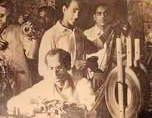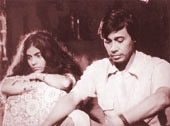 Assamese films are an integral part of Indian film industry. It originated from the 1930s. This film industry more or less grew simultaneously with the Bengali films.
Assamese films are an integral part of Indian film industry. It originated from the 1930s. This film industry more or less grew simultaneously with the Bengali films.The first Assamese film to release was Joymoti by Jyoti Prasad Agarwala in 1935. Jyoti Prasad drew on historical and literary sources to depict the tragic patriotism of a princess produced his first film. Along with this he also portrayed the parallels with the situation of disorder and disharmony unleashed by the British rule on the people of Assam for aligning themselves with the National Movement. The film starred Phanu Barua, Asaideo Handige, Mohini Rajkumari, Phani Sarma, Sneha Chandra Barua, and Shamshul Haque.
However, the Assamese audience did not appreciate Agarwala's film. Although not a commercial success, it is notable that at a time when the Bombay cinema was producing mythological films, Joymoti was about an historical event.
With the movies of Bhabendra Nath Saikia and Jahnu Barua Assamese films got recognition from the entire nation. Biplabi was a film Directed by Asit Sen in 1948. This film starred Anupama Bhattachrya, Chandra Phukan, Rani Nath and Jagat Bezbaruah. The film dealt with the theme of nationalism and sacrifice. The technical quality of the film set it apart from other films of the genre.
In the 1930s and 1940s the Assamese films that were made did have a lot of flaws. But in the 1950s the scenario altered as far as serious cinema was concerned. Piyali Phukan won the National award. The film was directed by Phani Sharma and the plot revolved around the life of a freedom fighter, Piyali Phukan. It was during these days that the Assamese director Nip Barua made his debut. His first film was Smrit Paras. He later made Assamese movies like Mak Aaru Moram and Ranga Police. These films were felicitated by the State Award of Assam.

In the year 1955 Era Bator Sur was directed by Bhupen Hazarika. This film starred Phani Sarma, Bishnu Rabha, Bijoy Shankar, Anil Das, and Chhaya Devi. The Assam tea gardens are the setting for this love story: a researcher and a flautist fall in love with the same woman. The researcher steps aside because he believes the flautist's art to be indispensable. The film focuses on the tea gardens and the folk music of the workers.
By the middle of the 1960s Assamese films were made on a regular basis. The film industry grew with time. The Assamese movies went onto win numerous national and international awards.
Dr Bezbarua was released in the year 1969. It was a crime thriller that starred Nipon Goswami, Brojen Barua, Meghali Devi, Tarun Duara, Ranjana Bordoloi, and Sadhan Hazarika. Other notable films during 1970s are Aranya (1971), Banaria Phool( 1973), Bristi(1974), Ganga Chiloner Pankhi( 1975) etc.
 Papori was a film of 1986, directed by Jahnu Barua. It starred Biju Phukan, Gopi Desai, Sushil Goswami, Dulal Roy, Runjun, and Amulya Kakoti. The story depicts a man falsely accused of murder, his dying daughter tended to by his wife, the rape of the wife, the honest policeman stymied by political corruption - a grim story relieved only by the epilogue that speaks of the eventual justice for the accused and the policemen's promotion. The film was set in the year 1983 during the All-Assam Students' Union turbulence.
Papori was a film of 1986, directed by Jahnu Barua. It starred Biju Phukan, Gopi Desai, Sushil Goswami, Dulal Roy, Runjun, and Amulya Kakoti. The story depicts a man falsely accused of murder, his dying daughter tended to by his wife, the rape of the wife, the honest policeman stymied by political corruption - a grim story relieved only by the epilogue that speaks of the eventual justice for the accused and the policemen's promotion. The film was set in the year 1983 during the All-Assam Students' Union turbulence.Surya Tejor Anya Naam(1991), directed by Dinesh Gogoi, starred Mihir Jyoti Baruah , Alok Nath, Violet Nazir, and Mridul Sutiya. The political turmoil of the state is the subject of this film, the first to clearly deal with the topic.
For more check the link given below:
https://www.indianetzone.com/2/assamese_films.htm
https://www.indianetzone.com/2/assamese_films.htm